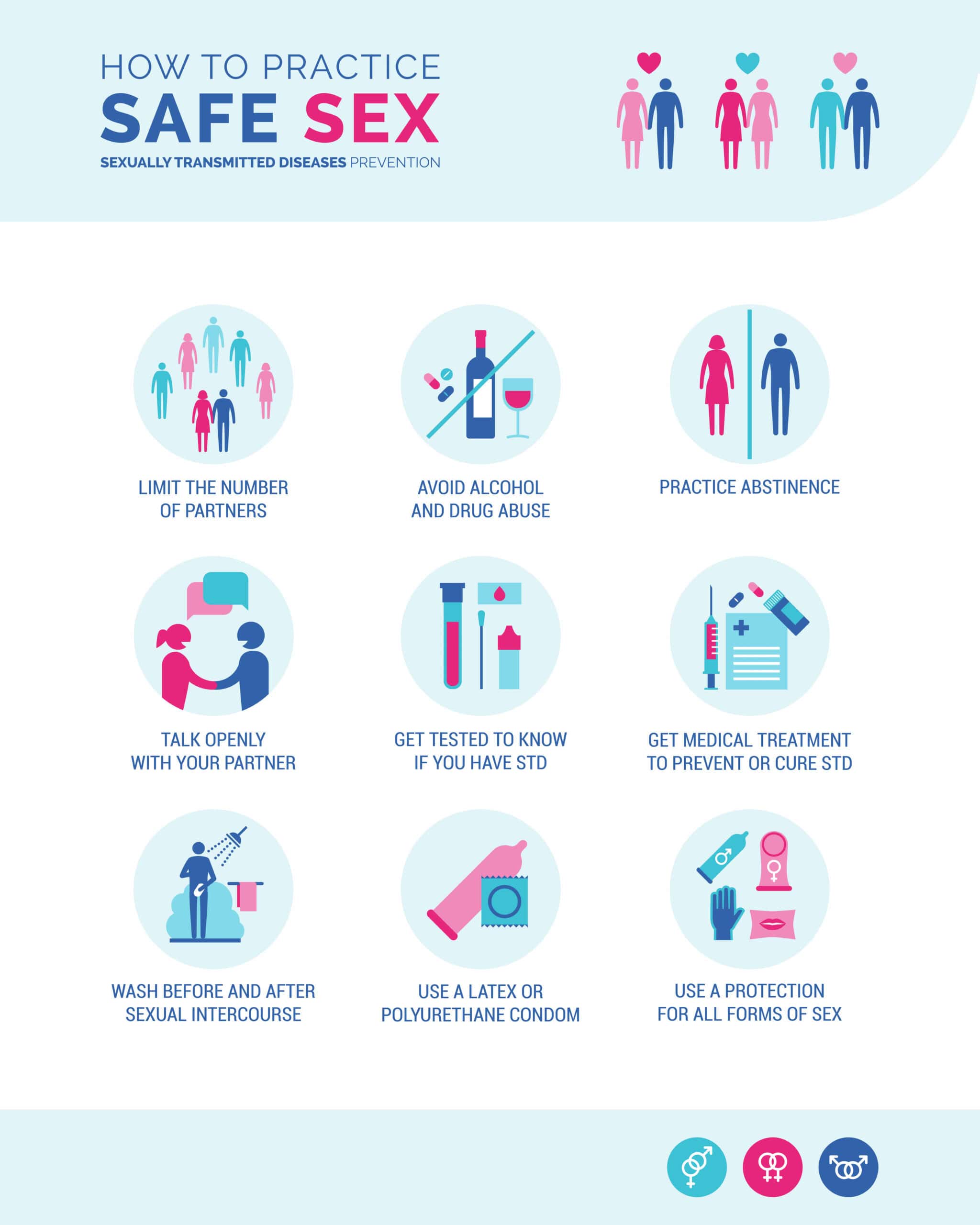 Medically reviewed by Dr Rick Singh – Chief Medical Officer at NextCare. Dr. Rick Singh, Board Certified in Family Medicine and trained in Emergency Medicine, completed his residency at ProMedica Flower Hospital in Ohio. Joining NextCare in 2014, he advanced through leadership roles before becoming Chief Medical Officer in February 2023.
Medically reviewed by Dr Rick Singh – Chief Medical Officer at NextCare. Dr. Rick Singh, Board Certified in Family Medicine and trained in Emergency Medicine, completed his residency at ProMedica Flower Hospital in Ohio. Joining NextCare in 2014, he advanced through leadership roles before becoming Chief Medical Officer in February 2023. Let’s talk about how to practice safe sex. It’s a topic that many of us learned about in health class, but the reality is that putting it into practice can be a bit more complicated. Whether you’re in a long-term relationship or exploring new connections, understanding and implementing safe sex practices is crucial for your health and well-being.
Safe sex isn’t just about preventing pregnancy. It’s about protecting yourself and your partner from sexually transmitted infections (STIs) and creating a comfortable, consensual environment.
The good news is that with the right knowledge and tools, practicing safe sex can become second nature.
Did you know that nearly 1 out of every 5 people in the United States has an STI? That’s a pretty staggering number. Even more eye-opening is that almost half of those cases occur in people between 15 and 24 years old.
These stats highlight why knowing how to practice safe sex is so important, regardless of your age or relationship status.
Understanding the Basics of Safe Sex
Before we dive into the specifics of how to practice safe sex, let’s clarify what we mean by “safe sex.” Essentially, it’s any sexual activity that reduces the risk of transmitting STIs or causing unintended pregnancy. This can include using barrier methods like condoms, getting regular STI screenings, and openly communicating with your partner about sexual health.

The Role of Condoms in Safe Sex
Condoms are the cornerstone of safe sex practices. They’re like the Swiss Army knife of sexual health tools – versatile, effective, and essential. When used correctly, condoms can dramatically reduce the risk of both STIs and unintended pregnancy.
There are two main types of condoms:
- External condoms (often called male condoms)
- Internal condoms (often called female condoms) Both types create a barrier that prevents the exchange of bodily fluids during sex. External condoms are worn on the penis, while internal condoms are inserted into the vagina or anus. Here’s a quick guide on how to use an external condom correctly:
| Step | Action |
|---|---|
| 1 | Check the expiration date and package integrity |
| 2 | Open the package carefully (avoid using teeth or scissors) |
| 3 | Place the condom on the erect penis before any genital contact |
| 4 | Pinch the tip to remove air and leave space for semen |
| 5 | Roll the condom down to the base of the penis |
| 6 | After ejaculation, hold the base of the condom and withdraw |
| 7 | Remove the condom, tie it off, and dispose of it in the trash |
Remember, condoms are single-use only. Never reuse a condom, and always have a fresh one ready for each sexual encounter.
Beyond Condoms: Other Barrier Methods
While condoms are the most well-known barrier method, they’re not the only option for how to practice safe sex. Dental dams, for instance, are thin sheets of latex or polyurethane that can be used during oral sex on the vagina or anus. They create a barrier between the mouth and genitals, reducing the risk of STI transmission. For those with latex allergies, there are non-latex options available for both condoms and dental dams. It’s all about finding what works best for you and your partner.
The Importance of Regular STI Testing
Using barrier methods is crucial, but it’s only part of the equation when it comes to how to practice safe sex. Regular STI testing is another vital component. Many STIs can be asymptomatic, meaning you or your partner could have an infection without knowing it.
When and How Often to Get Tested
The frequency of STI testing depends on various factors, including your number of sexual partners and types of sexual activities. As a general guideline: – Get tested annually if you’re sexually active – Get tested every 3-6 months if you have multiple or anonymous partners – Get tested before starting a sexual relationship with a new partner Remember, testing isn’t just about your health – it’s about being a responsible sexual partner. Planned Parenthood offers confidential STI testing and can provide more personalized advice on testing frequency.
Communication: The Unsung Hero of Safe Sex
When we talk about how to practice safe sex, we often focus on the physical aspects. But open, honest communication with your partner is just as important. It might feel awkward at first, but discussing sexual health, boundaries, and preferences is crucial for a safe and satisfying sexual relationship.
Starting the Conversation
Here are some tips for initiating that important safe sex talk:
- Choose a neutral time and place, not in the heat of the moment.
- Be honest about your own sexual health status
- Ask about their testing history and current status
- Discuss what safer sex practices you both feel comfortable with
- Be prepared to listen without judgment Remember, this isn’t a one-time conversation. Sexual health should be an ongoing dialogue between you and your partner(s).
Safe Sex Beyond STI Prevention
While preventing STIs is a crucial aspect of safe sex, it’s not the only consideration. Safe sex also encompasses:
Consent and Boundaries
Consent is a fundamental part of safe sex. It means that all parties involved freely agree to engage in sexual activity. Consent should be: – Enthusiastic – Ongoing (it can be withdrawn at any time) – Specific to each act – Given without pressure or coercion Establishing and respecting boundaries is also key. This might include discussing what types of sexual activities you’re comfortable with, safe words, or any triggers you want your partner to be aware of.
Contraception for Pregnancy Prevention
If pregnancy is a concern, it’s important to consider additional contraceptive methods alongside condoms. Options include: – Hormonal methods (pills, patches, injections) – Long-acting reversible contraceptives (IUDs, implants) – Sterilization (for those who don’t want children in the future) Discuss these options with your healthcare provider to find the best fit for you and your partner.
Safe Sex in Non-Traditional Situations
When we think about how to practice safe sex, we often picture a monogamous, heterosexual couple. But safe sex practices are important for all types of sexual relationships and activities.
Safe Sex for LGBTQ+ Individuals
While many safe sex principles apply universally, LGBTQ+ individuals may have some specific considerations: – Men who have sex with men should consider pre-exposure prophylaxis (PrEP) to reduce HIV risk – Lesbian couples should use barrier methods during oral sex and when sharing sex toys – Transgender individuals should discuss how hormone therapy might affect their sexual health with their doctor
Safe Sex in Non-Monogamous Relationships
For those in open or polyamorous relationships, safe sex practices become even more crucial. Some additional considerations include: – Regular STI testing for all partners – Clear communication about sexual activities outside the primary relationship – Agreeing on safe sex practices that all partners will follow.
When Safe Sex Isn’t Practiced: Next Steps
Despite our best intentions, there might be times when safe sex practices slip. If you’ve had unprotected sex or a condom breaks, don’t panic. There are steps you can take:
- Consider emergency contraception if pregnancy is a concern
- Get tested for STIs (some can be detected within days, others may take weeks)
- Discuss post-exposure prophylaxis (PEP) with your healthcare provider if you’re concerned about HIV exposure Remember the national STD hotline is available if you need advice or support (800) 227-8922.
FAQs about how to practice safe sex
It’s recommended that sexually active individuals get tested for STIs at least once a year, or more frequently if they have multiple partners or engage in higher-risk activities. Regular testing helps detect infections early, reducing the risk of complications and transmission. NextCare offers confidential urgent care STD testing to make testing simple and accessible.
People practice safe sex by using barrier methods like condoms, getting regular STI tests, communicating openly with partners about sexual health, and using additional contraception if pregnancy prevention is desired. It also involves obtaining enthusiastic consent and respecting boundaries.
One essential way to practice safe sex is to use condoms correctly and consistently for all types of penetrative sex (vaginal, anal, oral). Condoms are highly effective at preventing both STIs and unintended pregnancy when used properly.
The 5 C’s of safe sex are: Consent, Communication, Condoms, Contraception, and Check-ups (regular STI testing). These five elements form a comprehensive approach to sexual health and safety.
The safest form of contraception depends on your health, lifestyle, and preferences. Long-acting reversible contraceptives (LARCs) like IUDs and implants are among the most effective, with over 99% success rates. For STI prevention, condoms are the safest choice. Talk to your healthcare provider to find the best option for you.
Yes, while condoms significantly reduce the risk of STIs, they do not provide 100% protection. STIs that spread through skin-to-skin contact, like HPV or herpes, can still be transmitted even with condom use. For best protection, use condoms consistently and consider getting vaccinated for preventable infections like HPV.
Conclusion
Learning how to practice safe sex is an ongoing process. It’s about more than just using condoms or getting tested – it’s about creating a culture of open communication, mutual respect, and shared responsibility in our sexual relationships. Remember, safe sex practices aren’t one-size-fits-all. What works for one person or couple might not work for another. The key is to stay informed, communicate openly with your partner(s), and make decisions that you feel comfortable with.
By prioritizing safe sex, we’re not just protecting our own health – we’re contributing to the overall sexual health of our communities. So let’s keep the conversation going, break down the stigma around sexual health, and empower each other to make informed, responsible choices about our sexual lives. After all, when it comes to how to practice safe sex, knowledge truly is power. Stay safe, stay informed, and remember – your sexual health is worth protecting.
As one of the nation’s largest providers of urgent care services, NextCare offers STD testing and treatment, along with guidance on maintaining sexual health. You can easily find a nearby location and book an appointment for confidential testing and advice.
Treatment options are tailored to the patient’s current condition and the examples are to be used as possible treatment options. The actual treatment will be determined after an assessment performed by a medical professional. Additionally, procedures are recommended only after a comprehensive evaluation and a thoughtful determination of the most appropriate treatment options.
